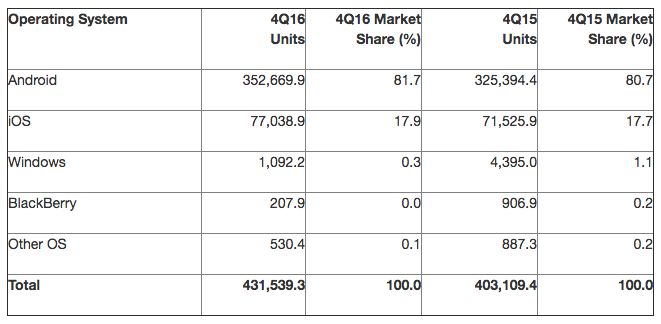- Liittynyt
- 17.10.2016
- Viestejä
- 9 569
Mobiilikäyttöjärjestelmien markkinatilanne on tällä hetkellä varsin yksitoikkoinen (Statista):

Käytännössä markkinoilla on vain kaksi kovaa tekijää: Android ja iOS. Androidin markkinaosuus on hieman yli 80% ja iOS:n puolestaan hieman alle 20%. Tässä vielä tilastot vuoden 2016 viimeiseltä neljännekseltä (Gartner).
 Microsoft vaikuttaa luovuttaneen Windows Mobilen suhteen ja BlackBerrykin on siirtynyt osittain Androidin puoleen. Maailmalla on kuitenkin useita Linuxiin perustuvia Open Source käyttöjärjestelmiä mutta ne eivät ole saaneet toistaiseksi tuulta alleen. Ubuntu Touch oli yksi potentiaalisimmista tekijöistä mutta Canonical lopetti sen kehittämisen. MeeGon pohjalta kehitetty Sailfish OS on puolestaan suomalaisittain hyvinkin tuttu mutta läpimurto on vielä tekemättä. Muita tekijöitä markkinoilla on mm. KDE Plasma Mobile, Lune OS (webOS) ja AsteroidOS.
Microsoft vaikuttaa luovuttaneen Windows Mobilen suhteen ja BlackBerrykin on siirtynyt osittain Androidin puoleen. Maailmalla on kuitenkin useita Linuxiin perustuvia Open Source käyttöjärjestelmiä mutta ne eivät ole saaneet toistaiseksi tuulta alleen. Ubuntu Touch oli yksi potentiaalisimmista tekijöistä mutta Canonical lopetti sen kehittämisen. MeeGon pohjalta kehitetty Sailfish OS on puolestaan suomalaisittain hyvinkin tuttu mutta läpimurto on vielä tekemättä. Muita tekijöitä markkinoilla on mm. KDE Plasma Mobile, Lune OS (webOS) ja AsteroidOS.
Vastikään perustettu Halium Project pyrkii ehkäisemään näiden eri Linux pohjaisten käyttöjärjestelmien pirstaloitumista, jotta niiden kehittäminen olisi helpompaa. Näin eri käyttöjärjestelmät saataisiin tuotua yhä useampiin laitteisiin ja mahdollisesti parannettua nykyistä tarjontaa.

Käytännössä markkinoilla on vain kaksi kovaa tekijää: Android ja iOS. Androidin markkinaosuus on hieman yli 80% ja iOS:n puolestaan hieman alle 20%. Tässä vielä tilastot vuoden 2016 viimeiseltä neljännekseltä (Gartner).

Vastikään perustettu Halium Project pyrkii ehkäisemään näiden eri Linux pohjaisten käyttöjärjestelmien pirstaloitumista, jotta niiden kehittäminen olisi helpompaa. Näin eri käyttöjärjestelmät saataisiin tuotua yhä useampiin laitteisiin ja mahdollisesti parannettua nykyistä tarjontaa.
Joku asioista paremmin ymmärtävä voisi suomentaa tuon lainatun tekstin.This open-source project is trying to pool developers from Ubuntu Touch ports, Sailfish OS community developers, the open webOS Lune OS project, and KDE Plasma Mobile contributors, among other developers (Jolla, we suspect) to put an end to the fragmentation seen in their respective project’s lower-level base. Currently, Ubuntu Touch, Sailfish OS/Mer, Plasma Mobile, and others use different Android source trees and methods for differently-built stacks. This leads to a lot of fragmentation among the most popular non-Android, GNU/Linux-based mobile OS projects in their use of the Android source tree, how the Android init is started, and how images are flashed to the device. Many of these projects essentially do the same job, but in a different way.
Ideally, these parts shouldn’t need to be separate, as all of these OSes have the same goal in the end – to boot while using Android binary drivers. Thus, the goal of Halium is to work towards a common Linux base, which can then be used by all of these different projects to boot on their respective handsets. This means standardizing the Linux kernel build and the Android HAL (Hardware Abstraction Layer), libhybris for Android driver support, and then having a standard set of user-space components. After that, high-level interface decisions are left up to the individual projects themselves, but the lower-level base would be shared.
Viimeksi muokattu:
